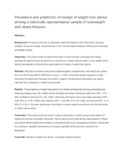Prevalence and predictors of receipt of weight loss advice among a nationally representative sample of overweight and obese Kenyans
Date
2020-06-20Author
Wernz, Cort
Mkuu, Rahma S
Leal, Nicholas
Stegall, Raven
Wekullo, Caroline
Woldu, Dawit
Harvey, Idethia Shevon
Metadata
Show full item recordAbstract
Background: As Kenya continues to experience rapid development and urbanization, growing evidence shows an increas- ing prevalence of non-communicable diseases (NCDs) and overweight and obese citizens.
Objectives: This study sought to explore the extent to which Kenyan overweight and obese participants reported receiving advice from physicians or health care providers to lose weight and to identify demographic characteristics associated with receipt of weight loss advice.
Methods: Descriptive statistics analyzed sociodemographic characteristics and weight loss advice from the 2015 Kenya WHO STEPwise survey (n = 1335). A bivariate logistic regression model estimated the association between socio-demo- graphic characteristics and weight loss advice reported from a physician or health care provider.
Results: The prevalence of weight loss advice from health professionals among overweight and obese participants was 19%. Model results indicated that obese individuals [odds ratio (OR) = 2.11, 95% confidence interval (CI) (1.36, 3.26)], individuals with higher than a secondary education [OR = 2.26, 95% CI (1.39, 3.68)], urban dwellers [OR = 2.38, 95% CI (1.29, 4.39)], and women [OR = 3.13, 95% CI (1.60, 6.12)] were significantly more likely to receive weight loss advice from their physician or health care provider.
Conclusion: This study found low levels of report of physician or health care provider advice for weight loss among overweight individuals. Advice was primarily reported by obese patients. Weight loss advice differed significantly based on educational attainment, geographical location, and gender thus calling for targeted interventions to increase equitable NCD prevention services from physicians.
URI
https://doi.org/10.4314/ahs.v20i2.45https://www.ajol.info/index.php/ahs/article/view/197923
http://ir-library.mmust.ac.ke:8080/xmlui/handle/123456789/1855
Collections
- Gold Collection [1026]

